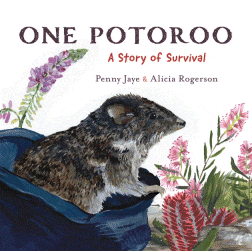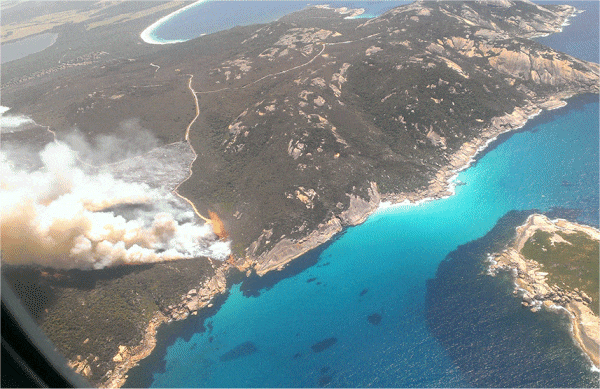
One Potoroo
One Potoroo
Penny Jaye
Alicia Rogerson
CSIRO Publishing, 2021
32pp., hbk., RRP $A24.99
9781486314645
Two Peoples Bay on the southern coast of Western Australia, just east of Albany, and fire is bearing down fast on the last-known natural population of Ngilkat, or Gilbert’s Potoroo.
After the flames have passed leaving only ash and bones behind, gentle hands find a tiny, burned potoroo huddling under a slab of granite; hands that are checking, caring, soothing and which pop him into a warm sack where he will be safe and secure on the journey to a new place. A place that doesn’t smell like home but which doesn’t smell like smoke and ash either, but where he will be cared for until he can be found a new home. A home that has granite boulders – but no pythons; a home that has melaleuca thickets – but no foxes. A home that has deep leaf litter and truffles – but no cats. Because this little chap is one of just a handful of his kind left on the planet, a species that was known to the Noongar people for tens of thousands of years, but was thought extinct because of the impact of introduced animals, and which had been rediscovered just 20 years earlier.
And so when his wounds have healed he finds himself once again in the sack and on the truck, this time heading to a new home in the Waychinicup National Park where there is food and protection from the predators. And where there are others of his kind who offer the promise of life…
While we have heard much of the plight of the koala following Black Summer, and Jackie French told us of the wombats, it is hard to grasp the extent of the destruction of all wildlife and their habitats until stories like this are put before us. Beautifully illustrated and narrated in a matter-of-fact way but with carefully chosen vocab that make the text as gentle as its subject, there is a desire to learn more about this tiny little creature, even form a cheer squad for its survival. There is more information at the back of the book to whet the appetite but this is a story to tell and a book to promote to any child or teacher planning to investigate Australia’s endangered species, because it is our rarest mammal and the world’s most endangered marsupial. Extensive, teachers’ notes covering science, sustainability and English are available and include suggestions for titles for related books such as Hold On! Saving the Spotted Handfish.
It is part of the unique story of our country, and the courage and resilience of its inhabitants.
